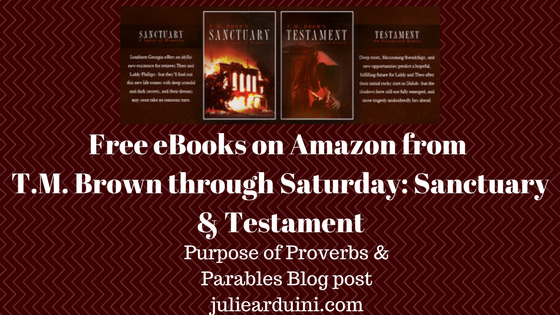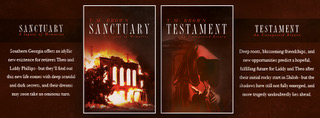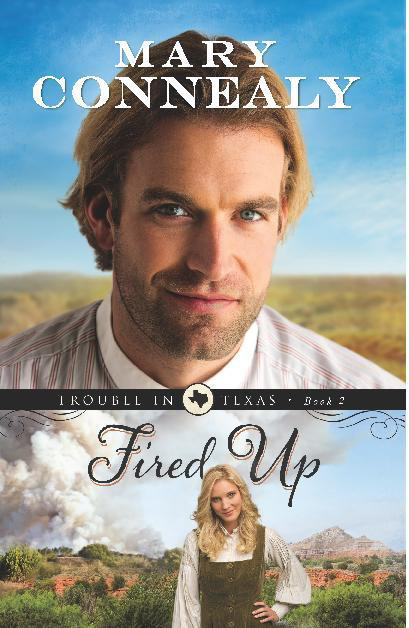T.M. Brown: Purpose of Proverbs and Parables (& FREE eBooks on Amazon!)
This post should have been published yesterday, and I apologize for the delay.
Please make sure you visit T.M.’s Amazon page as both Sanctuary and the newly released Testament are FREE KINDLE reads through Saturday, March 24. Don’t miss out! Testament’s paperback release will be March 27.
Purpose of Proverbs and Parables
The proverbs of Solomon son of David, king of Israel: For gaining wisdom and being instructed; for understanding insightful sayings; for receiving wise instruction [in] righteousness, justice, and integrity; for teaching shrewdness to the inexperienced, knowledge and discretion to a young man— a wise man will listen and increase his learning, and a discerning man will obtain guidance — for understanding a proverb or a parable, the words of the wise, and their riddles. The fear of the Lord is the beginning of knowledge; fools despise wisdom and instruction. Prov 1:1-7
Reading the psalms and proverbs in the Bible is highly recommended for a Christian’s daily study of God’s Word. There are so many common sense truths woven in them, but through those common sense truths, one unearth’s the spiritual message that connects truth with living well before God. However, how many take the time to read and study the deep thoughts of wisdom found in this part of the Bible. Even Jesus quoted or referred to the psalms and proverbs as a part of his teachings. His use of parables followed the tradition of speaking truths in riddles or proverbs.
So what is the purpose of these proverbs and parables? We only have to look to the first verses found at the beginning of Proverbs:
For receiving wise instruction [in] righteousness, justice, and integrity. Stated in other words: they help us become more receptive to understanding God’s Word, which guides us to live every day in ways that are right before God. And our lives should offer evidence of our knowledge of the truth, how it applies to all our relationships, and in a manner that pleases the Lord. In essence, it helps us to live our lives according to the God’s perfect, pleasing and good will.
For teaching shrewdness to the inexperienced. The nuggets of wisdom found in the proverbs and parables help us walk steadily and confidently through life as we mature as a child of God. Where we lack practical experience about many of life’s issues, the proverbs and parables provide the sound advice needed to make the best decisions. Shrewdness comes through experience unless you have a mentor to seek sound advice. Proverbs and parables offer guidance to navigate stressful situations and relationships using sound judgment.
For teaching knowledge and discretion to a young man. A teacher’s goal with any student is to become obsolete so that the student has learned how to learn, negating the necessity of the teacher: the highest pursuit of anyone’s education or knowledge. But, beyond knowledge lies discretion which some refer to as wisdom, ergo the proper application of one’s knowledge in life.
A wise man will listen and increase his learning. The maturity of wisdom is beyond grasping knowledge but applying it every day in the sight of others. Also, a wise man confesses that no matter how much we learn we will never know enough. In fact, the more we learn, the more we realize how much more there is to understand and learn. Only God is omniscient, or all-knowing!
The pursuit of wisdom is but a journey, not a destination.
A discerning man will obtain guidance. Likewise, a wise man never seeks to walk through life alone. A wise man recognizes God’s signposts and guides along life’s highway to find our way. Only the ignorant, obstinate, and blind fail to see God’s provision and thus stumble and fall through their narrow vision and lack of understanding. A wise man discerns rightly and confidently chooses the way God sets before him.
For this reason, the proverb concludes with this truth: The fear of the Lord is the beginning of knowledge; (because) fools despise wisdom and instruction. This “fear” is not fright or horror, but reverence and honor. A fear that might fall upon us should we would miss out on knowing and understanding how much the Lord loves us and desires to show us the way to go. The fear of never knowing the truth and missing the blessings that come from living rightly and wisely before the Lord.
How about you? Have you invested in seeking to learn from the Lord by digging into God’s Word to start or finish every day, desiring another “aha” morsel of truth and understanding?
Coach, a.k.a. T. M. Brown
He (Jesus) would speak the word to them with many parables like these, as they were able to understand. And He did not speak to them without a parable. Privately, however, He would explain everything to His own disciples. Mark 4:33-34
What did the Lord want His disciples to learn by teaching them in parables? Answer: The closer you are to the Lord, the clearer the parables and proverbs become to you.
Words of Wisdom #91-1PR, www.coachbrown.org
 T.M. Brown
T.M. Brown
Mike to all his friends
The Baptist College of Florida
Southern Baptist Theological Seminary
T. M. Brown is a Southern boy at heart, although he’s lived and traveled in many states far removed from his beloved boyhood roots in Georgia and Florida. He returned to his Southern roots several years ago while his two sons were still in school and regularly traveled throughout the South before returning to college shortly after his youngest son graduated. In the last fifteen years he has preached, taught and coached in Alabama, Georgia and Florida until his wife and he moved outside of Atlanta and retired to write, travel, and spoil grandchildren.










